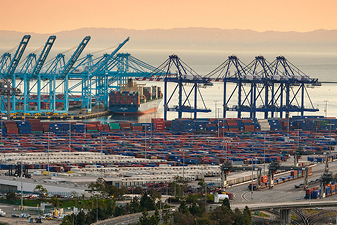|
By Cecile Entleitner, Associate, Blakey & Agnew
Each year on May 22 the United States celebrates National Maritime Day. The holiday was declared by Congress in 1933 to commemorate the American steamship Savannah's voyage to England, marking the first successful crossing of the Atlantic Ocean using steam power. National Maritime Day recognizes and pays tribute to the Merchant Marine and the various sectors within the maritime industry.
The maritime shipping industry has been heavily impacted by the COVID-19 pandemic. The American Association of Port Authorities reports containerized cargo volumes have dropped 20-25 percent compared to the same time period in 2019. Nevertheless, many ports have taken on a leadership role during this crisis, working tirelessly to continue moving essential supplies. For example, Port of Los Angeles Executive Director Gene Seroka was appointed as the city's Chief Logistics Officer and leads the Logistics Victory Los Angeles (LoVLA) initiative, a new program to match available medical supplies with the health care providers who need them. As its most recent achievement, LoVLA secured an agreement to purchase 24 million N95 masks for high-risk, essential workers. The Port of Los Angeles also serves as the temporary homeport for the USNS Mercy hospital ship, currently handling acute trauma cases and other urgent needs for patients not infected with COVID-19, allowing shore-based hospitals to focus their medical resources on the treatment of coronavirus patients.
Other ports around the world have stepped up to the plate as well. Recognizing their critical role in the international supply chain, 20 members of the Port Authorities Roundtable (including U.S. ports in Los Angeles, Long Beach, and Seattle) signed a declaration in late April committing to stay open during the pandemic. The joint declaration, signed by port authorities across Asia, Europe, the Middle East and North America, calls for the adoption of best practices for ship crews and shore personnel to safely handle cargo and encourages ports to continue collaborating to safeguard unimpeded maritime trade.
On May 5, the United Nations Global Compact's COVID-19 Task Force issued a series of recommendations calling for a comprehensive, global approach to support the continued safety and efficiency of ocean-related supply chains. Noting that nearly 90 percent of international trade is transported by sea, the task force urged global coordination and cooperation between governments to avoid additional supply chain disruptions. It recommended adopting an internationally recognized "key worker" status for those operating
|

essential services; maintaining open borders; establishing uniform, fact-based, and globally consistent compliance procedures; and the creation of a dedicated Ocean Supply Chain Task Force.
While Congress has provided emergency relief funding to certain impacted industries, some maritime stakeholders believe more is needed. Commissioners Bentzel and Sola of the Federal Maritime Commission wrote to Congress expressing concerns that marine terminal operators will face difficulties in fulfilling lease payments and other contractual obligations to port authorities due to decreases in cargo volume. The Commissioners cited predictions that the container shipping industry could experience losses of $23 billion this year because of supply chain disruptions. The letter urges Congress to address the current limitations on terminals to use existing relief funds and implement further provisions to mitigate the financial gaps impacting the maritime transportation system. Heightened safety measures and cleaning procedures have also led to increased costs for marine terminals and stevedores. To help manage these additional expenses, the National Association of Waterfront Employers has requested a one-time, $400 million federal grant to invest in necessary cleaning supplies and personal protective equipment.
When Senators return to Capitol Hill in May, the Committee on Environment and Public Works will consider its biennial water resources development reauthorization. The bill, titled America's Water Infrastructure Act (AWIA) of 2020, would provide approximately $17 billion in new funding authorization for infrastructure projects. Building on the bipartisan water infrastructure legislation enacted in 2018, the AWIA includes investments to improve our nation's dams, ports, flood-prevention infrastructure, reservoirs, and inland waterways. Additionally, the legislation aims to enhance water infrastructure resiliency as well as increase the transparency and accountability of projects receiving federal funding.
Blakey & Agnew, LLC is a public affairs and
communications consulting firm based in
Washington, DC.
|


